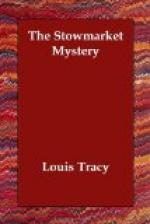TO BEECHCROFT
Thenceforth, as the French say, events marched. Robert Frazer faithfully recounted Margaret’s statement to the barrister and the detective. The “documents,” copies of which Ooma sent to the ill-fated woman whose sudden accession to wealth had proved so unlucky for her, were evidently those stolen from the drawer in the writing-desk at Beechcroft.
Here, at last, was the motive of the murder laid bare.
The Japanese, by some inscrutable means, became aware that the young baronet possessed these papers, and held them in terrorem over his reputed sister. In the hands of a third person, an outsider, they were endowed with double powers for mischief. He could threaten the woman with exposure, the man with the revelation of a discreditable family secret.
He visited the library in order to commit the theft, probably acting with greater daring because he mistook the sleeping David for his cousin. Having successfully wrenched open the drawer and secured the papers, still holding in his hand the instrument used for slipping back the tiny lock, he turned to leave the room by the open window, and was suddenly confronted by the real Sir Alan, who recognised him and guessed his object in being present at that hour.
Brett had gone thus far in his spoken commentary on the affair as it now presented itself to his mind when Winter asked:
“Why do you say ‘recognised’ him, Mr. Brett? We have no evidence that Sir Alan had ever seen Ooma?”
“What, none? Search through your memory. Did not the stationmaster see a third David Hume leave the station that day when the movements of only two are known to us. What became of this third personage during the afternoon? Where did he change into evening dress? Why did Sir Alan leave documents of such grave importance in so insecure a hiding-place?”
“There is no use in asking me questions I can’t answer,” snapped the detective.
“Perhaps not. I think you said that you amused yourself in your Middle Street lodgings by taking to pieces a small electrical machine fitted together by your companion?”
“Yes, sir; but what of that?”
“Let us suppose that, instead of a complex machine he built a small arch of toy bricks, and you were well acquainted with the model whilst each brick was numbered in rotation, don’t you think you could manage to reconstruct the arch after repeated efforts?”
“I expect so.”
“Well, my dear Winter, we have now got together every material stone in our edifice. Mrs. Capella’s yielding to blackmail is the keystone of the arch. Every loose block fits at once into its proper place. The Japanese, Ooma, must have met Sir Alan and discussed this very question with him. The baronet must have unwittingly revealed the family secret, and the Jap was clever enough to perceive its value. Further, the murder was unpremeditated, the inspiration of a desperate moment, and the weapon selected shows a sort of fiendish mandate suggested by family feud. Ooma is undoubtedly—”




